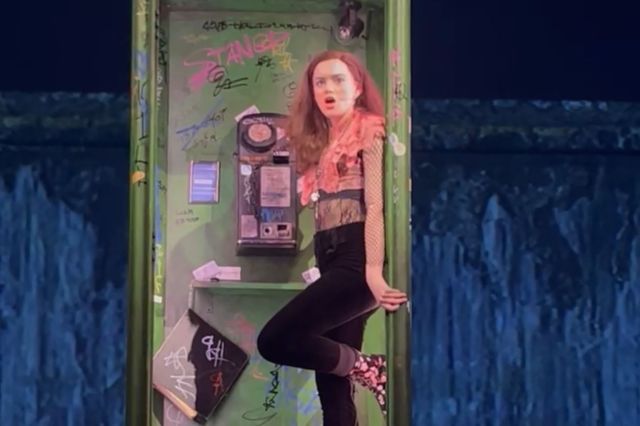Pete & Dud: Come Again (tour)
Chris Bartlett and Nick Awde’s comedy is set during a TV chat show on which Dudley Moore guests in 1982. Consequently, the audience find themselves being co-opted as the studio audience for this very show. As we enter the auditorium, technical types mince around adjusting the lighting and polishing the piano. Soon an oleaginous host bearing a gruesome resemblance to Terry Wogan bounds onto the stage and begins trotting out some truly hackneyed jokes. Then, having had his audience practice their applause technique, he introduces Dudley Moore.
The live interview is a neat device which allows the playwrights to “revisit” supposedly key moments in Moore’s relationship with Peter Cook. So, from 1960, we get the youthful Beyond the Fringe team – including rather gauche incarnations of Jonathan Miller and Alan Bennett – planning their assault upon British comedy. Then we’re transported to the 1965 heyday of Not Only…But Also. And so on through to 1982.
Structurally, this piece works extremely well, and the switching back and forth from the live interview to the past is a credible and economic way of depicting the protagonist’s lives. However, the show’s tacky execution and its simplistic approach towards its characters make it difficult to engage with. Firstly, there’s the characterisation. Not only are all these people painted in the broadest of brushstrokes, but for reasons best known to Owen Lewis, the director, the colour they’re painted in is a lurid pink. Everyone is portrayed as being relentlessly camp.
Simon Lowe, a fine actor who has caught many of Dudley Moore’s mannerisms, needs to tone down the winking and pouting. Moreover, his largely convincing vocal delivery struck this viewer as unnecessarily fey.
Meanwhile, William Belchambers’ impossibly effeminate Jonathan Miller bears little relation to the man himself.
The play’s underlying message appears to be that Moore’s professional success and popularity with women drove Cook into paroxysms of envy and despair. Such reductive treatment of a complex relationship makes for rather one dimensional theatre. And those who find Cook to be the more interesting of the pair may be frustrated by the emphasis on Moore.
Even so, the brilliance of the original performers inevitably shines through and there are some highly enjoyable scenes. A routine involving Pete & Dud’s respective problems with Sophia Loren and Greta Garbo is a joy to watch, as is the depiction of the birth of Derek and Clive, Pete and Dud’s comic alter-egos. The charismatic Gareth Tunley also deserves credit for gamely inhabiting the role of Peter Cook, and Alexander Kirk’s slimy talk show host is an excellent creation.
– David Gavan
NOTE: The following FOUR-STAR review dates from March 2006 and this production’s earlier London run at The Venue, Leicester Square.
The theatrical dead comics’ society – which has seen such partnerships as Morecambe and Wise and Spike Milligan and the Goons celebrated in The Play What I Wrote and Ying Tong respectively – now has another revival meeting to attend in Chris Bartlett and Nick Awde’s affectionate, revealing Pete and Dud Come Again, which reunites the legendary partnership of the late Peter Cook and Dudley Moore.
Anyone who saw the stage recreation of another comedy sketch show, Round the Horne… Revisited, may be struck by a slight feeling of déjà vu by seeing this at the same venue, since that show, too, cast the audience as a studio audience. But while Round the Horne was a recreation of a radio show, this time we’re at an imagined Wogan-like TV chat show interview in 1982. The stage is set, in every sense, for an unexpected reunion between the two when Dud returns to England from Hollywood – where by now he has reinvented himself as a “sex thimble” – to promote a film. The interviewer (and in turn the play) rewinds over the pair’s past, deeply competitive professional and personal lives.
It’s a canny device, and is carried in the uncanny impersonations of Kevin Bishop (as Dudley Moore) and Tom Goodman-Hill (as Peter Cook) into the realm of something more. Beyond the meticulous renderings of some of their comic set piece routines, there’s also the tug of something at once human, tentative and unresolved about the painful demons that stalked them both.
Bishop’s Dud is a masterful study in bumptious surface confidence but with a crippling insecurity – born of teases about his club foot and height deficiency – beneath (though Bishop isn’t quite as short as Dud was). Goodman-Hill is new to the cast since the play tried out in a shorter version at the Edinburgh Fringe last year, and has just the right dry, laconic air of this mordantly funny man who lost himself in drink.
A Terry Johnson-directed Channel 4 TV film called Not Only But Always, screened two Christmases ago, played out the dark side of Moore and Cook’s relationship; but in a theatre, resounding the sound of laughter for much of the time, the stillness of such moments is accentuated.
Owen Lewis directs a cast that also includes a ringer for the younger Wogan-like presenter in Alexander Kirk, with Colin Hoult and Fergus Craig as Jonathan Miller and Alan Bennett respectively, plus an assortment of other cameos.
– Mark Shenton












